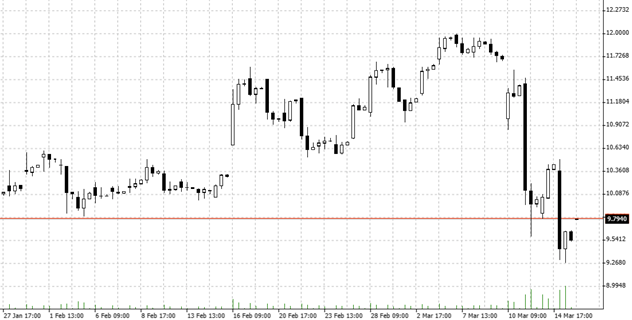

16.03.2023 – These are truly interesting times for traders: Credit Suisse is teetering and the world’s stock markets are trembling. Is this now a natural market shakeout or a systemic crisis? The danger of a global bank run is growing. Which in turn increases the long chances for a major bailout.
Investors invested in the major Swiss bank are wavering between hope and trepidation. Don’t say you didn’t know about this: we already covered the matter in this space last October under the title “Omens from Switzerland.” In any case, the looming collapse of Credit Suisse has also hurt its German rivals. Here is the four-hour chart of Commerzbank.

Source: Bernstein Bank GmbH
The recent shockwaves were triggered by a careless statement by Ammar Abdul Wahed Al Khudairym, that is the Chairman of Saudi National Bank. He categorically ruled out additional financial support in an interview with Bloomberg TV. The Arab bank is a major shareholder of Credit Suisse. And unfortunately, last year the major Swiss bank reported a loss of 7.3 billion francs and massive withdrawals of client assets amounting to 123 billion.
Lifeline from the SNB
Crisis of confidence plus bungling PR – the crash is preprogrammed. The disaster was foreshadowed on Tuesday, when Credit Suisse published its annual report for the year 2022 and admitted mistakes in it. But maybe the house will still be saved: According to reports from the news agencies Reuters and AFP, Credit Suisse will borrow up to 50 billion Swiss francs from the Swiss National Bank.
The looming conflagration
Going long or short on Credit Suisse is one side of the coin. The big danger is a conflagration in the banking system. First the collapse of American regional banks. Now the crisis in Europe, which looks a lot like 2008. After all, Credit Suisse is the first global systemically important bank since the financial crisis to receive state money in order to survive. We are curious to see what happens next. If investors all over the world now play it safe and clear out their accounts, no matter how healthy banks are – it will end badly. If cash is king, the bank run is imminent. Then the stock markets will continue to crash. Until the world’s major central banks intervene in a concerted effort.
It all depends on the central banks
In fact, what matters now is the interest rate policy going forward. The deeper problem is the cold turkey at the commercial banks: After about a decade of cheap money with zero interest rates even for the worst houses, interest rates have risen rapidly. And with that, skill in management is needed to generate returns. Which means that only the best will survive. In other words, until now, even small startups with no revenue or profit went to banks for cheap financing. Now they stay away and the institutions have to look for new sources of money. Which brings us to the opportunities for traders: Volatility is likely to increase sharply in the coming days. Whether long or short – Bernstein Bank wishes good luck!
__________________________________________________________________________________
The content of this publication is for general information purposes only. In this context, it is neither an individual investment recommendation or advice nor an offer to purchase or sell securities or other financial products. The content in question and all the information contained therein do not in any way replace individual investor- or investment-oriented advice. No reliable forecast or indication for the future is possible with respect to any presentation or information on the present or past performance of the relevant underlying assets. All information and data presented in this publication are based on reliable sources. However, Bernstein Bank does not guarantee that the information and data contained in this publication is up-to-date, correct and complete. Securities traded on the financial markets are subject to price fluctuations. A contract for difference (CFD) is also a financial instrument with leverage effect. Against this backdrop, CFD trading involves a high risk up to the point of total loss and may not be suitable for all investors. Therefore, make sure that you have fully understood all the correlating risks. If necessary, ask for independent advice. CFDs are complex instruments and are associated with the high risk of losing money quickly because of the leverage effect. 68% of retail investor accounts lose money trading CFD with this provider. You should consider whether you understand how CFD work and whether you can afford to take the high risk of losing your money.7
